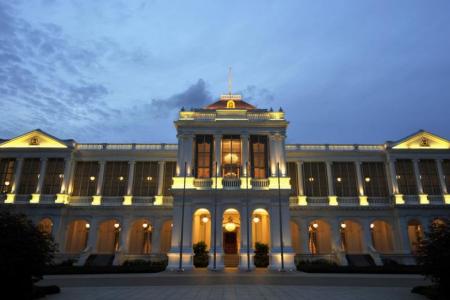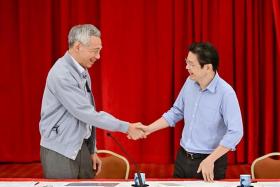Presidential election to take place in September
This year's presidential election will be pushed back to September, to avoid the campaigning period coinciding with National Day celebrations in August, said Minister in the Prime Minister's Office Chan Chun Sing on Monday (Feb 6).
In the past, Polling Day typically fell on the last week of August. Campaign rules will also be amended to discourage divisive electioneering.
The Government will no longer designate rally sites for presidential elections. Candidates will still be allowed to hold rallies, but must apply to the Police for a permit to do so.
They can also use social media platforms or hold indoor private sessions with specific groups of voters. Candidates will also get more television airtime.
Mr Chan made these announcements in Parliament during the debate on changes to the way presidential elections are run, as spelt out in the Presidential Elections (Amendment) Bill.
Presidential hopefuls will get more time to submit their papers, and the committee which assesses whether they are eligible to run for election will also have more time to go through applications.
In another change, a 16-member Community Committee will be set up to assess whether a candidate belongs to a particular racial group.
Changes to constitution
-
Parliament debates proposed amendments to the Presidential Elections Act on Monday (Feb 6), that follows broader constitutional changes to the elected presidency passed in November last year.
Two other announcements, which do not require amendments to the law, were also made that will change how presidential elections will be run.
Click on the panels to find out more.
-
The presidential election this year will be held in September, to avoid having election campaigning during the National Day celebrations now and in the future.
Since 1991, presidential elections have taken place in the second half of August, at the end of each president’s six-year term. Campaigning typically took place during the National Day period.
This year, the Writ of Election will be issued in the later part of August, and polling day will take place in September. An acting president -the chairman of the Council of Presidential Advisors, or the Speaker of Parliament if the chairman is not available – will assume office until a new president takes office.
-
There will no longer be specific sites designated for candidates to hold their election rallies. Instead, those who want to hold a rally will have to secure their preferred sites and apply to the Police for a permit.
Candidates will get more television airtime to reach out to voters.
Besides television airtime, candidates can also use social media or have indoor private meetings with specific groups of voters.
-
Presidential hopefuls will get more time to submit their papers.
The deadline for applying for a certificate of eligibility will be extended to five days after the Writ of Election is issued, up from three days.
There will also be at least 10 days between the issue of the Writ and Nomination Day, up from five days.
-
A Community Committee will be set up to assess which racial group candidates belong to for all presidential elections.
The 16-member committee will consist of a chairman and three five-member sub-committees for the Chinese, Malay, and Indian and other minority groups.
All hopefuls must declare to the committee which of the three main communities they consider themselves a part of. They will be issued a certificate if the sub-committee is satisfied they belong to that community.
-
Overseas Singaporeans will get more time to register as an overseas voter, with the deadline being extended to two calendar days after the Writ of Election is issued.
There will also be automatic recounting of votes when the vote margin between the top candidate and any other candidate is 2 per cent or less of the total valid votes. This avoids unnecessary delays while waiting for candidates to request a recount.
The Returning Officer can also give more time for overseas votes to reach Singapore for counting.
These follows broader constitutional changes to the elected presidency, passed by Parliament in November last year.
An election will now be reserved for members of a racial group if there has been no president from that group for the five most recent presidential terms.
The changes to the format of presidential elections mean that more time is needed between the issuing of the Writ of Election and Polling Day. In the 2011 presidential election, the writ was issued on Aug 3.
Campaigning began after National Day (Aug 9) but was held during the month-long National Day celebrations period, said Mr Chan. Voters went to the polls on Aug 27.
"Given the slightly longer time required for the new process and to avoid holding presidential election campaigns during the National Day celebrations period, we will adjust the timing of the polls for the forthcoming elections," he added.
The Government will therefore issue the writ for the election later in August, before President Tony Tan Keng Yam's term expires on Aug 31. This is so that if the election is contested, Polling Day will fall in September instead of August.
"This resets the clock" so that in the future, presidential election campaigning will also take place outside the National Day period, assuming Presidents serve their full six-year terms, said Mr Chan.
He added that if a new President is not elected by the time Dr Tan's term expires, the Constitution provides for an acting President until a new President is elected and assumes office.
Under the Constitution, this will be the chairman of the Council of Presidential Advisers or the Speaker of Parliament.
National unity
The Government also agreed with the Constitutional Commission, which reviewed the elected presidency last year, that campaigning for President should be consistent with the President's position as a symbol of national unity.
"Campaign methods for the presidential elections must not inflame emotions and must be in keeping with the decorum and dignity of the office of the President," said Mr Chan.
As presidential elections are national, the Government will encourage the use of platforms that reach out to voters at a national level, he added.
It is studying different ways to increase the amount of television airtime for candidates.
At the 2011 election, there were individual campaign broadcasts and a televised forum.
Get The New Paper on your phone with the free TNP app. Download from the Apple App Store or Google Play Store now



